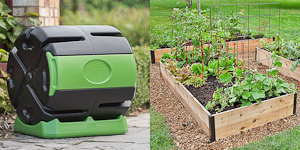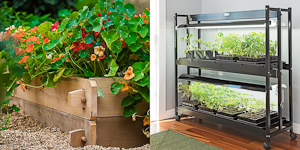- Home
- Growing Onions
- Onion Diseases
Onion Diseases
Most of the major onion diseases are caused by fungi or bacteria, or sometimes by soil nematodes. As organic gardeners, though, it will not really help us much to know which disease we’re dealing with.
This is because once our plants become sick, organic disease control measures are very limited, regardless of which specific disease is making our plants sick.
The good news though, is that most onion diseases can be prevented.
Preventing Onion Diseases
There are five easy things we can do to prevent diseases from attacking our plants in the first place:
1) Water at ground level. Onions should be watered at ground level, either by a dripline, leaky pipe, or irrigation tape. Keep a careful eye on soil moisture levels to assure that the soil stays moist enough to remain loose, crumbly and easily pushed aside by the onion once it starts forming its bulb. But make sure also that the onions do not stay wet.
2) Be careful with mulch. A light, airy mulch like straw can help keep onions from drying out too much between waterings, as well as reduce weeds. However, if you do mulch them, make sure you have well-drained soil, and wait until the plants are well-established and strong before applying mulch.
3) Provide good air circulation. Space plants no closer than 4” apart, and don’t hem them in with taller or denser plants that will block or inhibit air movement.
4) Spray actively aerated compost tea. Properly prepared compost tea can be sprayed on plants to give them a huge boost in disease resistance. I’m not speaking of ordinary compost tea, but actively aerated compost tea, which contains billions of beneficial fungi, bacteria and other microorganisms which outcompete the pathological disease-causing organisms.
5) Practice crop rotation. This is an important practice throughout the garden, and requires careful planning and good record-keeping. When you draw up your vegetable garden layout at the beginning of the season, make sure you don’t plant crops in the same place as the previous year. Crop rotation is more challenging when you have a smaller garden, but do the best you can.
Some fungal and bacterial diseases may be controlled by spraying with neem oil. However, my personal preference is to immediately remove diseased plants from my garden when I discover them, to prevent their spread as well as carryover to future years.
To learn more about growing onions, visit these related articles:
Types of Onions
To grow large bulb
onions it’s very important to choose types of onions that match how far
north or south you live, because onions need to experience a certain day
length before they switch from growing green tops to forming bulbs.
Find out which types (and varieties) will work for you!
Planting Onions
All
about planting onions: how deep and how far apart to plant, the
difference between growing from seed, onion sets or onion transplants,
and when to plant onions for maximum bulb growth.
Growing Onions from Seed
There
are some advantages to starting your own onions from seed, but you’ll
need to start them indoors in order to get a jump on the season and give
your onions enough time to develop bulbs. Find out how and when to
plant, and when to transplant outside.
Onion Bolting
Onions
will send up a flower stalk if they become stressed, which takes energy
away from growing nice large bulbs. Learn how to prevent onion bolting,
and what to do if onions do start to go to seed.
Harvesting Onions
Make
sure to wait for harvesting onions until the tops start turning brown.
Learn the proper way to harvest and cure onions for the most successful
winter storage.
Storing Onions
There
are several cool and clever ways to store onions, but the most
important things are to provide excellent air circulation and to keep
them dry. Read about tips and tricks for storing onions.
Help share the skills and spread the joy
of organic, nutrient-dense vegetable gardening, and please...
~ Like us on Facebook ~
Thank you... and have fun in your garden!
Affiliate Disclaimer
This website contains affiliate links to a few quality products I can genuinely recommend. I am here to serve you, not to sell you, and I do not write reviews for income or recommend anything I would not use myself. If you make a purchase using an affiliate link here, I may earn a commission but this will not affect your price. My participation in these programs allows me to earn money that helps support this site. If you have comments, questions or concerns about the affiliate or advertising programs, please Contact Me.Contact Us Page



